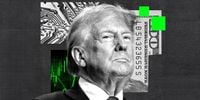As the global financial landscape shifts, investors are grappling with the ramifications of U.S. President Donald Trump's escalating trade war, which has ignited volatility in the markets and prompted a significant reassessment of economic forecasts for 2025. With the stock market experiencing its worst quarter since 2022, many are left questioning the future of their investments amid the uncertainty.
On April 1, 2025, the S&P 500 and Nasdaq Composite indices closed with losses of 5% and 10%, respectively, marking a stark contrast to the double-digit gains seen in previous years. The downturn was largely attributed to the anxiety surrounding Trump's impending tariff announcements, which he has dubbed "America's Liberation Day" as he prepares to roll out new tariffs on April 2. Financial Minister Scott Bessent has publicly stated that the U.S. government is not concerned about the market's volatility, a sentiment that has left many investors feeling uneasy.
According to a recent survey by the American Association of Individual Investors (AAII), a staggering 52% of investors are adopting a pessimistic outlook for the stock market in the upcoming six months, a significant increase from the historical average of 31%. This sentiment is echoed by the CNN Fear and Greed Index, which has plummeted to levels indicating "extreme fear" among market participants.
In a striking turn of events, fund managers have been selling off stocks at a record pace. A survey conducted by Bank of America between March 7 and March 13 revealed that managers have underweighted the U.S. market by 23%, the lowest level since June of the previous year. This trend reflects a broader shift in sentiment as analysts and investors alike recalibrate their expectations in light of the economic climate.
Goldman Sachs was among the first major banks to adjust its forecasts, lowering its target for the S&P 500 from 6,500 to 6,200. In a note released on March 30, strategists indicated that they expect earnings per share (EPS) growth for the index to drop to just 3% in 2025, down from an earlier estimate of 7%. The rationale behind this adjustment includes anticipated higher tariffs, slower economic growth, and increased inflation.
Citibank and HSBC have also revised their stock ratings, with Citibank downgrading its assessment from "overweight" to "neutral" and HSBC following suit with similar concerns about growth. Barclays has taken a particularly cautious stance, slashing its target for the S&P 500 to 5,900, indicating that they foresee earnings being adversely affected by the new tariffs, which could lead to a significant slowdown in the U.S. economy.
Across the Atlantic, European markets are also feeling the ripple effects of Trump's trade policies. On April 2, 2025, the DAX index fell by 0.7% to 22,390 points, while the MDAX and EuroStoxx 50 followed suit with similar losses. The uncertainty surrounding the tariffs has led to a retreat among investors in the German stock market, although there are signs of resilience as some sectors, such as renewable energy, continue to perform well.
Pharmaceutical stocks, however, faced considerable pressure as Trump hinted at potential import tariffs on medications. Companies like Bayer and Sartorius saw their shares drop by up to 4%. Conversely, Nordex, a wind turbine manufacturer, experienced gains of over 3%, buoyed by new contracts from Turkey.
As the U.S. stock market braces for the impending tariff announcements, the Dow Jones, S&P 500, and Nasdaq 100 indices opened approximately half a percent lower on April 2. However, the Dow Jones managed a slight recovery, closing up by 0.1% as investor sentiment fluctuated throughout the day. Tesla's stock, initially down by more than 6%, rallied to gain over 5% after news emerged that CEO Elon Musk might refocus his efforts on the company.
The oil market is also reacting to the looming tariffs, with Brent crude prices dipping to $74.01 per barrel and WTI falling to $70.76. Analysts suggest that investors are exercising caution as they await the specifics of Trump's tariff strategy, which is expected to target various countries with trade surpluses against the U.S.
Amidst this backdrop, some analysts are observing a potential shift in investment patterns as European markets appear to outperform their U.S. counterparts. Despite the recent volatility, indices like the Stoxx Europe 600 and the DAX have shown surprising resilience, closing the first quarter on a stronger note than their U.S. counterparts.
Professor Christine Laudenbach from the Leibniz Institute for Financial Market Research notes that the uncertainty stemming from rapid policy changes in the U.S. is prompting investors to consider reallocating their funds to Europe. According to Morningstar analysts, European investors withdrew €2.85 billion from U.S. equity ETFs and redirected €14.6 billion into European equity ETFs between mid-February and mid-March 2025.
Furthermore, the European Central Bank (ECB) has taken steps to lower interest rates, contrasting the U.S. Federal Reserve's hesitance to cut rates amid rising inflation concerns. This divergence in monetary policy could further incentivize investors to seek opportunities in European markets.
As the dust settles from the trade war and its associated market fluctuations, the outlook for both the U.S. and European markets remains uncertain. The impact of Trump's tariff policies will likely continue to reverberate through the financial landscape, shaping investor sentiment and economic forecasts for the foreseeable future.






